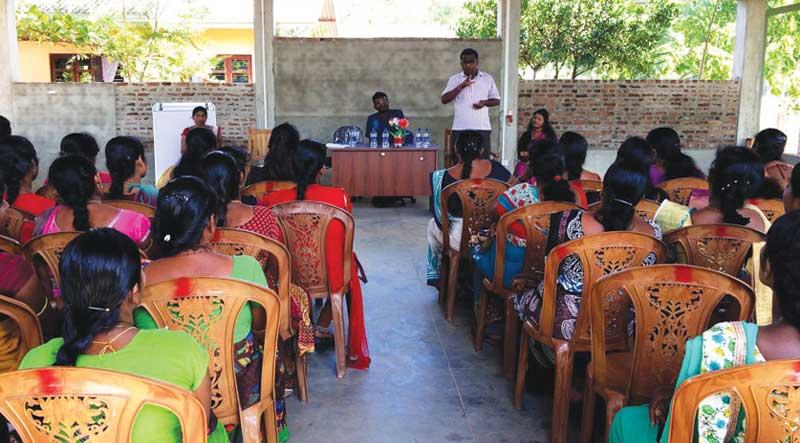
The initiative to encourage entrepreneurship in 25,000 women chosen from among Samurdhi families as an initiative that will contribute to them moving from being “dependent on the State” to “contributors to the economy”, a media release from the Women’s Chamber of Industry and Commerce (WCIC) stated.
“We are also encouraged to note that these networks of shops will function under government sponsorship with a Rs. 1,000 million as government contribution to provide credit facilities and that priority will be given to sell local products.
“We hope this initiative will benefit many courageous females who have micro-cottage industries to grow and scale their businesses. One of the focus areas of WCIC is to build the capacity of women in the micro sector to grow and scale and obtain financing as needed for this progression. WCIC looks forward to assisting the micro women entrepreneurs. The measures to promote Small and Medium Scale exports (TIEP Scheme) backed by a contributor insurance scheme to assist in working capital needs to export quality goods through high value addition to local inputs will also certainly assist the SME Exporters.
Providing a conducive environment to encourage local manufacturing, and prevent unfair competition
“We congratulate the government on its proposal to encourage local businesses, especially in the agriculture , dairy and pharmaceutical manufacturing sectors via the proposed concessions and tax relief. We believe it is a step in the right direction.
“Industries such as local footwear manufacturing industry has to import most material from outside which make their products uncompetitive in pricing against imported finished products. A preferential duty scheme for identified items will make the local products price competitive.
Expenditure on R&D
“The budget proposal to impose a cess to provide protection on the imports and exports of domestic production and removal of import taxes on the raw materials not available in the country, machineries and equipment with modern technology, to boost exports, and also to encourage domestic industries to produce value added goods and ensuring a fair VAT regime where locally produced goods get the same benefit of VAT exempted imports will assist industries that face unfair competition in a positive manner.
“We commend the government for proposing to reduce the expenditure on research and development expenses of local entrepreneurs involved with the Institute of Nanotechnology from taxes and allocating Rs. 2,000 million to initiate the registration of the Sri Lanka identity of these products.
 “We should propose schemes to encourage investment to expand businesses, similar to those provided for new investments, to recognise the contribution of established businesses, to the economy which we believe also has been done to a greater extent in the current budget.
“We should propose schemes to encourage investment to expand businesses, similar to those provided for new investments, to recognise the contribution of established businesses, to the economy which we believe also has been done to a greater extent in the current budget.
Finance
“We commend the government on its proposal to implement a credit certification scheme to develop small and medium scale enterprises in rural areas.
This will assist the SME entrepreneurs to be successful in accessing finance when needed.
“We also note the new insurance scheme to support those who temporarily lose livelihoods due to the quarantine process related to epidemics including Covid-19. Lack of working capital financing for SMEs has resulted in significant layoffs during the pandemic. We hope that this scheme will be used to develop a sustainable scheme to finance SMEs who do not have adequate collateral to obtain financing to retain staff in a crisis situation.
“It is important to develop the right skills based on the needs of the future workplace.
We are encouraged by the proposals to invest in education and modernise and convert vocational education institutes to degree awarding entities with the objective of combining vocational education with entrepreneurship and skill development.
“We also believe we should up-skill or re-skill women who have taken a career break due to childbirth or family commitments and wanting to rejoin the workforce. Due to changes in the environment, some jobs have changed and they may not be able to fit into similar roles. But if they are multi-skilled, they could be employed again in other areas.
“Entrepreneurs also need new skills and mentoring to scale up their businesses and not miss out on opportunities.
“This focus on upgrading the vocational education standards we believe could assist in these objectives too.
Investment in healthcare, childcare and elderly care sectors
“We hope the proposed allocation of Rs 18,000 mn for the expansions of the health care sector and the upgrading of nursing schools to degree awarding institutions will also benefit in encouraging investment and skill development of reliable child care and elderly care facilities.
Up-skilling and fair wages fornon-formal sector workers
“We need to have a longer-term plan to increase the high-skilled workers seeking foreign employment and reduce the number of unskilled women who go overseas as domestic help.
We should also explore the possibility of employing these women locally and pay similar salaries to these workers. The additional benefits they could enjoy are: being closer to the family, having visibility to how the money they earn is spent, familiar living conditions in the home country etc.
“At present there are no schemes in Sri Lanka to ensure the rights of domestic workers and to maintain the dignity of labour.
Those who work as domestic aids locally and in foreign countries end up not having any savings and rely on Government social security schemes. We recommend the government to consider including this sector too in the proposed contributory pension scheme to be formulated for the self-employed.
“We recommend the government to create a database of all the returnees, their skills and areas of work sought and last salary. For the returnee domestic services, we propose to create a similar engagement program of trained people who will be monitored and employed systematically,” the statement noted.
